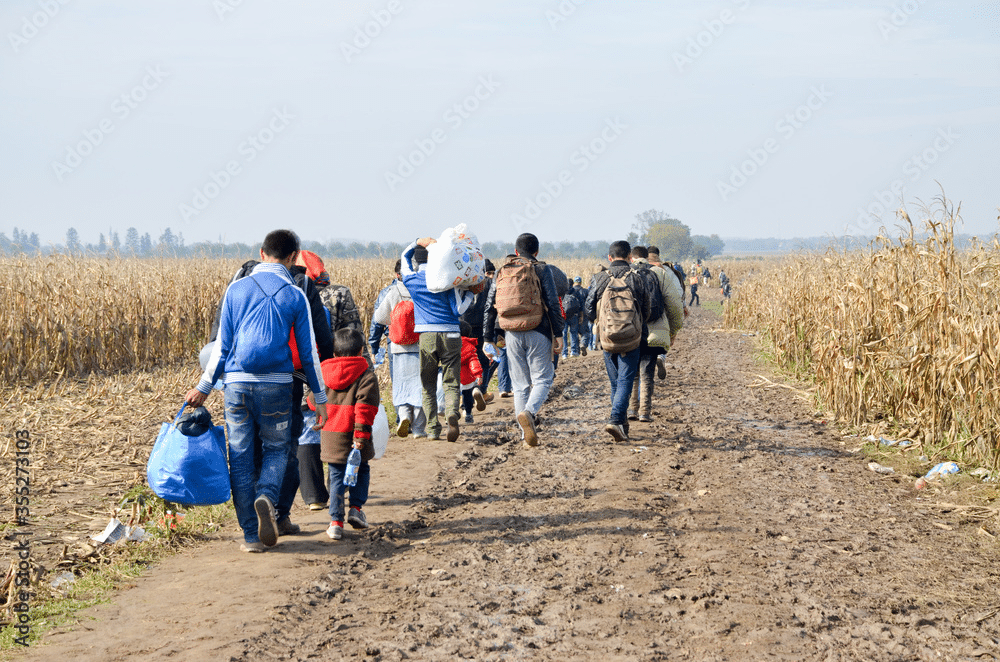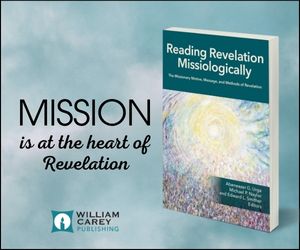EMQ » January – April 2024 » Volume 60 Issue 1

Summary: The refugee crisis presents an urgent opportunity for the church to embody the gospel through compassionate action. By welcoming the displaced into congregations, embracing them as family, and grounding efforts in biblical theology, Evangelicals can participate in God’s redemptive work and be a transformative force for refugees.
By Kaisa Golding and Jim Olang
A pastor recently preached about the need to make room in our homes and safe havens. He explained that once he had children, they slowly overtook his house – from the toys in the living room to the mounds of laundry in the bathroom. He found it frustrating because he was used to doing things a certain way.
He soon realized that if he wasn’t going to allow space for these children in his house he should live alone. He went on to note that the church is like a family. We need to make space in our house for newcomers even if this means that we need to adjust our understanding of what church looks like.
In recent years, the global church has witnessed a significant shift in the geography of missions. Traditionally, missions was often seen as an endeavor carried out in distant lands, far from the comforts of home. At the same time, Christians have been praying for the opportunity to evangelize in countries that have traditionally been more closed to Christianity.
The refugee crisis has brought the mission field to our doorstep. Churches around the world are now confronted with the reality of a multinational world right outside their doors. This shift challenges congregations to grapple with how to engage in cross-cultural ministry within their own communities.
Demonstrating Transformative Power
In a small seaside village in Finland, a local church faced the dilemma of integrating an influx of refugees from diverse linguistic and cultural backgrounds. They decided to hold their church services in multiple languages every Sunday.
Sometime later, a race-related conflict erupted in the local community. Several local grandmothers in the church went out to find the men targeted in the conflict and sat down next to them in a show of solidarity. Even though they had no mutual language, their message was clear – these men are a part of our family.
In a world marked by division and hostility, their church demonstrated the transformative power of the gospel and became a beacon of hope and reconciliation. When non-believers witness genuine welcome and care for refugees like this, they encounter a tangible expression of Christ’s love.
The bold step by their church to integrate all of the linguistic and cultural groups within the one service expanded the church family. It was also a practical embodiment of the biblical exhortation to treat the foreigner as native-born (Leviticus 19:33-34).
Caring for Fellow Image-Bearers
Understanding and applying this commandment in Leviticus in today’s context is paramount. Viewing refugees not as others but as fellow bearers of God’s image changes our perspective. It calls us to transcend linguistic, cultural, and national boundaries to recognize our shared humanity.
The call to engage in refugee care and advocacy resonates deeply with the Evangelical tradition. The roots of this movement are grounded in a deep concern for justice, compassion, and the proclamation of the gospel. Throughout history, Evangelicals have been at the forefront of various social justice movements, and the current refugee crisis is no exception.
The Old Testament Scriptures repeatedly emphasize the importance of caring for the vulnerable and the stranger in the land. This principle is rooted in God’s character. It extends beyond ancient Israel and continues to hold relevance for believers, today.
It provides a clear mandate for welcoming and caring for refugees, recognizing their inherent dignity and worth as fellow image-bearers of God. This is the kind of dignity and validation a father has after weeks on the road seeking shelter – now finally safe with his young family – watching his children safely asleep in warm beds.
However, our response to the refugee crisis should not be solely based on a sense of duty but also come from a profound understanding of God’s redemptive narrative. Throughout the Bible, we encounter stories of displacement, exile, and refuge. From the Israelites’ journey through the wilderness to Joseph’s exile in Egypt, God’s people have experienced the pain of displacement. These narratives serve as a reminder of God’s empathy for the displaced and his call for his people to extend compassion to those in similar situations.
Welcoming Those in Need
Recently, I (Kaisa) got lost trying to find a bus stop outside an airport in Italy. I tried several times to speak to the lady at the airport information desk, but each time I was met with exasperation and a quick wave of the hand in the general direction. The second time she gave me a map, but for someone as directionally challenged as me, this was not much help.
Finally, I decided to just go for it. I chose a direction and prayed that I would find my way. Along the way, I stopped several times, but I didn’t understand what anyone was saying. Everything felt hectic, confusing, and unfriendly. After I found the bus and boarded, someone from the seats gave me a friendly smile. This simple gesture, amidst everything else that felt foreign, meant the world to me. And if I wound up having any more problems, it seemed like this person would be receptive to help me find my way.
My experience at the Italian airport is a poignant reminder of the disorientation and isolation that refugees often face when displaced from their homes. Amidst chaos, a simple act of kindness – a warm smile – can be a beacon of hope. It is a reminder of our duty to create spaces of refuge and belonging for those in desperate need.
The refugee crisis is a profound challenge and opportunity. As followers of Christ, we are called not only to proclaim the gospel but also to embody its transformative power through acts of compassion and hospitality. This responsibility transcends borders and demands our collective attention.
The statistics – 110 million forcibly displaced individuals – can be overwhelming.[i] However, our hope rests in a God who deeply cares for the marginalized and vulnerable. The stories of transformation witnessed through organizations like the Refugee Highway Partnership (RHP, refugeehighway.net) exemplify this hope in action.
RHP’s network of individuals, ministries, and churches provide practical support and spiritual solace to refugees worldwide. God has called many everyday people to walk alongside refugees, as the hands and feet of Jesus. This is the Missio Dei.
Acts of compassion greatly impact the lives of refugees. For example, in Greece, a refugee ministry worker encountered a refugee overwhelmed by despair. She offered the only resource she had – prayer. This simple yet powerful gesture of empathy demonstrated how our faith propels us to stand with those in their darkest hours.
The Evangelical response to the refugee crisis is not limited to humanitarian efforts alone. Our understanding of God’s heart for the marginalized and displaced compels us to extend a welcoming embrace to those in need.
For guidance, we can turn to our fellow believers in the Global South, who have navigated these challenges with grace and resilience. Their experiences offer invaluable insights into how to stretch and adapt our churches to accommodate newcomers. The voices of these partners on the RHP leadership team shape the direction of our global efforts, reminding us that this work is not limited by geographical boundaries.
And it is in the long process after initial displacement where the global church can play a unique role. All along the highway, there are ministries and dedicated Christians visiting refugees inside refugee camps, when allowed; befriending and sharing life together with asylum seekers in countries where they await, often for years, to receive a proper refugee status and a chance at resettlement; and welcoming the lucky few who are granted a permanent opportunity to resettle in a safe country and a real opportunity to rebuild their lives.
Remembering Persecuted Believers
In our pursuit of refugee care, it is crucial to extend our embrace also to persecuted believers who have become forcibly displaced. The Open Doors’ report “Church on the Run” underscores the urgent need to welcome these brothers and sisters who have faced persecution for their faith.[ii] Their arrival at our church doors necessitates not just shelter but genuine integration into the body of Christ.
In Jordan, I (Kaisa) met a sister who had fled because of her faith. Her entire family had turned against her. She could no longer see her children. Her prayer was that one day she would be able to hear their voices on the phone. She had lost her entire family. Another brother in Finland spoke of the very real threats faced by those who convert to Christianity. Their children in school received threats from classmates from a similar ethnic background.
These brothers and sisters who have lost everything need the body of Christ to come together, love, and care for them as family. And when these family members arrive on our doorstep, what a blessing their strong witness can be to the congregation as a whole.
Participating in God’s Redemptive Work
In conclusion, the Evangelical response to the refugee crisis is a multifaceted endeavor that encompasses missional fervor, theological conviction, and practical compassion. It calls the church to align its actions with its beliefs, to view refugees through the lens of God’s Word, and to be a living testimony to the transformative power of the gospel.
The refugee crisis puts us at the crossroads of compassion and action. Our response is a testimony to our commitment to follow in the footsteps of Christ. By viewing refugees not as statistics but as individuals with inherent worth, we lay the foundation for transformative ministry. Through organizations like RHP, we see the tangible impact of love in action. When we welcome refugees, including persecuted believers, we embody Christ’s teachings and contribute to the healing and restoration of those who have been uprooted from their homes.
As we engage in refugee care and advocacy, we not only extend the love of Christ to those in need but also participate in God’s redemptive work in the world. This is the heart of refugee ministry – a response grounded in faith, love, and a commitment to uphold the dignity and worth of every human being.

Kaisa Golding (kaisa@refugeehighway.net) is the global coordinator of the Refugee Highway Partnership (RHP). From 2020-2022, she served on the RHP global leadership team, and was an integral part of growing the RHP network in Oceania. She holds an MA in English literature and linguistics and has worked in diaspora contexts in Japan, Canada, Australia, and Finland. Kaisa and her husband, Simon, are missionaries with the Finnish Lutheran Overseas Mission (FLOM).

Jim Olang (jim@aeafrica.org) is a seasoned communication and development expert from Kenya. He holds a BA in communications (with honours) and an MA in theology from Africa International University. He is the head of communications and programs at the Association of Evangelicals in Africa, and a key member of the RHP global leadership team. He also serves as the Africa coordinator for Edifi, a Christian podcasting network.
[i]UNHCR, The UN Refugee Agency, “Refugee Data Finder: Key Indicators,” https://www.unhcr.org/refugee-statistics/ (accessed October 15, 2023).
[ii] Eva Brown, Elizabeth Lane Miller, Rachel Morley, and Helene Fisher, “The Church on the Run: IDP & Refugee Report 2022,” Open Doors, June 2022, https://www.opendoors.org/en-US/research-reports/idp-persecution/IDP-Refugee-specific-religious-persecution-report-Church-on-the-run-June-2022.pdf.
EMQ, Volume 60, Issue 1. Copyright © 2024 by Missio Nexus. All rights reserved. Not to be reproduced or copied in any form without written permission from Missio Nexus. Email: EMQ@MissioNexus.org.









Responses